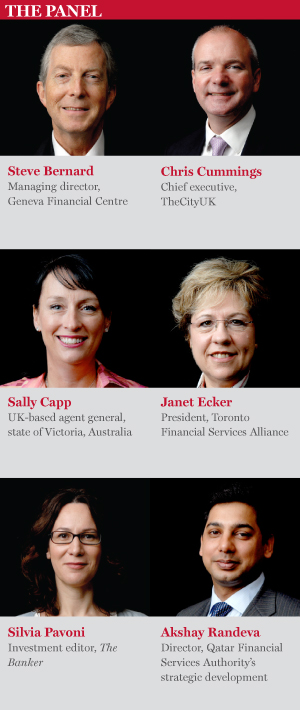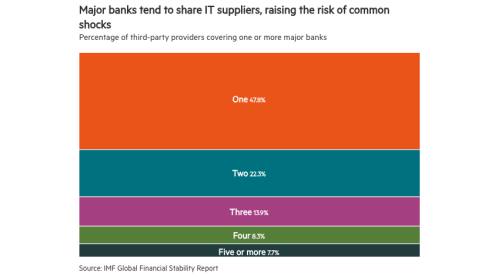Beleaguered by the financial crisis and threatened by heavier regulation, the world’s largest financial centres are trying to deal with political pressures while keeping an eye on their long-term growth plans and liaising with hubs from emerging markets that are growing in size and ambition.
Understandably, the jurisdictions that were hurt the most by the financial crisis, such as London and New York, are the ones that provoked the strongest regulatory response. But heavier new banking and financial markets rules have been raising concerns on the possible unintended consequence of hurting the competitiveness of international financial centres (IFCs) in the US and Europe. The US has produced the Dodd-Frank Act, which has predominantly focused on keeping the over-the-counter derivatives market under control, and also includes strict rules on certain trading activities. Europe has developed heavier capital requirement regulation, contained in Basel III, and is currently discussing the possible introduction of a financial transaction tax.
More stringent measures have been discussed for certain EU states, with Switzerland requesting higher levels of capital for its largest banks, UBS and Credit Suisse, while banks in the UK may be forced to ring-fence their retail operations from their investment divisions. Financial centres need to deal with policies fuelled by angry taxpayers who at best have come to dislike financial institutions and their largess and, in the worst cases, have seen the state forced to move to save failing banks. Bigger communication efforts are needed if the financial sector wants its views heard.
Reputational damage
“From a UK perspective, one of the challenges that we have here is that our reputation as a sector was damaged through the financial crisis,” says Chris Cummings, chief executive of TheCityUK, an independent membership body that promotes the UK-based financial and professional services industry. “We know that the public looks to politicians to bring about a stable regulatory system and so politicians have put pressure on regulators to respond with more vigorous responses. From the industry’s perspective, we sometimes get portrayed as the unwilling bride dragged to the altar of regulatory reform and I think that’s partly a misreading of how the industry is engaged with the desire to see new regulation.”
A less hospitable regulatory environment will push business away, according to many voices within the industry. Within Europe, some asset managers have reportedly chosen to locate in Switzerland instead of London due to more favourable tax and regulatory conditions. The country has also benefited from its stable, predictable, low-tax market. However, as Steve Bernard, managing director of Geneva Financial Centre, points out, the events just beyond the country's border are not to be ignored. And certain new rules have been introduced to safeguard Switzerland's investors and its economy.
“When your neighbours are potentially at risk you cannot relax,” says Mr Bernard. “Regarding the regulation side, from the Swiss perspective, I’m not sure it’s much different [from the rest of Europe]. We want to protect the customer, the investor; we want to protect the creditors, we want to protect the country from systemically relevant banks and we have two strong institutions in the country, hence a special regulation for them, and we are also concerned about reputation risk.”
Counterproductive regulations?
If tougher regulation in certain areas is inevitable in some IFCs, others feel its implementation in their jurisdictions will be counterproductive. Indeed, centres that navigated the global financial crisis relatively unaffected resent rules designed to fix problems generated elsewhere but which will be applied internationally.
Janet Ecker, president of the Toronto Financial Services Alliance and a former finance minister for the Ontario province, has strong views on this. “Canada’s financial services system came through the turmoil relatively unscathed,” she says. “People used to make jokes about our banking systems being too stodgy and too conservative... [But] as our federal finance minister [Jim Flaherty] likes to say, stodgy is the new sexy.”
Heavier, overenthusiastic regulation coming out of other jurisdictions in the world will possibly have an undesired impact on the centres that had no part in generating the financial crisis. “One of the concerns that Canada has had is the old law of unintended consequences,” says Ms Ecker. “When I was a finance minister [in Ontario], I used to joke that there’s nothing more dangerous than a government determined to do something, and we have the entire globe’s worth of governments determined to do more regulation.”
Watch the videoThis is an edited video of the discussion from The Banker's Exclusive Leadership Series. Click below to view more:
|
Risk management measures
Regulation does not necessarily prevent crises, but good risk management does, and Ms Ecker points out that the Canadian approach has always made sure that extra caution was exercised when applying rules, not because it was imposed by law but because it was imbedded in individual risk management systems.
Sally Capp, the London-based agent general for the state of Victoria in Australia, agrees and adds that corporate culture is key to ensuring that an organisation takes the appropriate risk management measures. “If, ultimately, your main aim is to get best returns for shareholders, and they are often short-term aims as well, with all due respect, within [the financial services sector], this drives behaviours that are counter often to what the risk management process [requires],” she says.
Excessive regulation could also damage environments where there are appropriate risk management practices by introducing strict rules that are not needed in that specific jurisdiction, and may interfere with judgement on how to manage risk. Ms Ecker says: “We’re quite concerned that some of the rules and regulations that are being debated are not going to solve the problems, and they’re going to penalise [jurisdictions] that have had a good [risk management] system and are working well together.”
So, new regulation is needed, but not necessarily everywhere. IFCs need to rebuild their reputation with a strong stand against industry lapses, but must be careful not to inadvertently drive that entire industry away. Local issues should be dealt with but, ultimately, a level playing field across jurisdictions should be the aim. So what is the solution?
Engaging with regulators
Communication and coordination between all parties involved, at national and international level, is crucial. This is a point that united all of the round table participants. “Better engagement with regulators from the industry is absolutely fundamental,” says Mr Cummings. “But, of course, the UK is not an island. We operate within the wider European environment and our challenge, from the UK’s perspective, is to make sure that European regulation gets framed with an international, global outlook but with a sense that we have to keep Europe competitive; that it’s not sufficient for Europe to be competitive just within itself, it has to be internationally competitive otherwise we will lose out to more attractive markets, certainly in Asia.”
Emerging markets that are experiencing continued economic growth and were not at the epicentre of the financial crisis are not producing harsher financial regulations, meaning that a significant expansion of their financial hub is highly plausible.
Qatar is a case in point. Sustained by a 20% gross domestic product growth anticipated for this year, after a 16% expansion in 2010, the Middle Eastern country has been ramping up investments in its financial centre. The country has been sustained by oil and natural gas reserves and is keen to make sure that it is ready to deal with the growing attention of the financial services world, which is keen to have a major role its strong economy.
Akshay Randeva, director of Qatar Financial Services Authority’s strategic development, says, however, that it is crucial that new regulation is coordinated at international level, even for centres that are enjoying a sustained economic growth and have the ability to invest in financial infrastructure. “The fact that we are living in a very interconnected world is almost a common stream in all of our conversations [with the industry and other centres],” says Mr Randeva. “In this period of volatility, there’s nothing that can impact an industry more than the lack of a coordinated response and the uncertainty that automatically creates. And that’s [something] which even looking [at the issue] from the outside... is a concern.”
Delivering a balanced solution
IFCs obviously compete against each other for business. Yet, the future of all of them is increasingly interconnected because of the global ties that financial markets and international businesses have. Overwhelming international regulation could mean interfering with, and potentially damaging good risk management practices and business models. But a lack of regulatory coordination can lead to regulatory arbitrage.
Ms Ecker says: “[This] interconnectedness means one of two things: you’re either going to get some countries that are going to [introduce] tougher or different kinds of rules that will drive business underground or [drive] companies to other jurisdictions – so we’re going to get regulatory arbitrage; or we’re going to have global rules that are going to damage those systems that, [thanks to] their business culture, their regulation, their business models – such as Canada – didn’t have some of those issues [that created the financial crisis].
You need co-operation between your regulator, your policy-makers and your industry because financial services is a highly complex [sector]
Coordination is needed not only between regulators of different jurisdictions, but also between regulators of different disciplines. This may involve Basel III and the Dodd-Frank Act focusing upon the world of banking and its market trading, Solvency II targeting the insurance sector, and the European Directive on Alternative Investment Fund Managers looking at hedge fund and private equity businesses. Although designed for different markets, these regulations often affect the same financial groups that have operations in all these markets, making their implementation even more complex.
“Businesses are no longer rigid into silos: I’m a bank, I’m an insurance company, I’m an asset manager,” says Mr Cummings. “What we find is [that] businesses are affected by all of these. And yet one of the challenges, from a business perspective, is to help our regulators [and] our politicians understand that the world doesn’t conform to neat little pigeonholes.”
Ms Ecker adds: “You need co-operation between your regulator, your policy-makers and your industry because financial services is a highly complex [sector] and no matter how good a regulator or a government is, they’re never going to be as in tune with what’s happening on the street.”
The 'real economy'
But because the financial sector’s reputation has been so badly hit in the past few years, it is understandable that some will feel uneasy about financial institutions complaining about stricter regulation. Further, the complexity of some of its products and the generous pay packages of some of its executives have only served to further demonise those working within financial institutions and make the industry seem detached from other economic activities.
IFCs ought, therefore, to help in re-establishing this link, according to the participants of the roundtable. “What we have to do is provide what some politicians like to call the ‘real economy’ with a viewpoint; so having Lufthansa explain why hedging is essential to keeping its aeroplanes in the sky is far more important than a [financial] market participant explaining [the financial market’s] point of view,” says Mr Cummings. “We find businesses, [small companies] and the public much better advocates of financial services than the financial services [sector] currently [is].”
If some parts of the world are dealing with trying to convince politicians and regulators that they ought to support the competitiveness of their financial centres, other jurisdictions are dealing with creating incentives to attract new companies. In both cases, IFCs are well advised to stay clear from tempting short-term fixes.
Ms Capp says that IFC authorities can play a key conduit role between the government and the industry to make sure that any initiatives, whether aimed at containing systemic risk in the financial markets or attracting businesses to their jurisdiction, are sensible and have durable effects. She says: “On the one hand, there’s definitely an understanding in the Australian market that long-term regulation that brings certainty, reduces complexity and cost [and] supports business is important. On the other side, you’ve got some of those shorter-term incentives on how you attract companies. It’s actually not a win for our community or economy to have a company come in, set themselves up, look all glossy and successful and then 12 months later have to pull out because the reality was not what was presented.”
Realising new opportunities
Despite this regulatory uncertainty and the financial sector’s reputation being in tatters, there is still cause for optimism. As the countries housing the world’s leading financial centres continue to cope with various political and economic issues, there are new pockets of wealth being created around the world. Emerging economies are going to require financial products that meet their growing needs and firms that have enjoyed success operating in mature markets will be eyeing these opportunities in newer markets.
“[There are] whole new sets of consumers as economies around emerging markets grow,” says Mr Randeva. “The developed markets in most of the [financial] products are dealing at levels close to maturity. I don't see how much reinsurance is going to grow, for example, in Europe. However, if I go down to Qatar, I'm looking at a country which… the International Monetary Fund says is the richest in the world on a per capital purchasing power parity basis, ahead of Luxembourg.”
Mr Randeva adds that the insurance sector is growing at a rate of 27% in Qatar, a rate that has been sustained for the past decade. “Emerging markets facing [high economic] growth, [such as] India and Brazil, need a lot of help with managing this growth responsibly,” he says. “They require expertise, they require skills, they require capital. And that leads to a lot of opportunities for the developed world.”
TheCityUK’s Mr Cummings agrees and highlights the importance of free trade and open markets to allow for an efficient transfer of skills and capital. “Brazil is a wonderful case in point of an economy that has experienced inflation problems and debt problems, and is now running a simply wonderful public education financial literacy programme, and yet isn't a [totally] open market able to take advantages of some of the skills that [Mr Randeva mentioned],” he says. “If the world is going to start to grow again, getting past 1%, 1.5%, then we need to look at the liberalisation of trade around the world.”
Emerging challenges
Increasing sophistication of emerging markets is presenting opportunities to established financial centres but also a few challenges. As growing economies demand something more than the most basic of financial products, international firms are faced with the dilemma of servicing those markets from headquarters or sitting next to their new clients and set up shop in emerging jurisdictions.
Emerging markets facing [high economic] growth, [such as] India and Brazil, need a lot of help with managing this growth responsibly
“You cannot just sell [fast-growing markets’ clients] a bread and butter product – they went to North American universities, they are articulate, they are demanding,” says Mr Bernard. “So for the industry, it's very challenging to put relationship managers in front of those people. The issue for us, for the banking industry in Switzerland, is whether to develop an onshore presence in those countries, or to continue to do cross-border business from Switzerland, making sure that we comply with the [local] regulation.”
Mr Randeva raises the point of making sure a firm’s commitment to a market is established very early. He asks: “At what point in that growth curve do you think it is essential for you to move from an offshore suitcase banking model into demonstrating the commitment to create that brand, start creating the relationships to participate in that growth? Do you actually want to be in the position where [you are going to be asked to] explain why in 2011, 2012, 2013 you did not move; where were you when India was happening and the Middle East was happening?”
This goes back to the initial point of collaboration. To make sure opportunities are not missed, it is also key that there is co-operation between developed and emerging financial centres to share knowledge, expertise and help create ties between firms based in different jurisdictions. London, for example, is in discussion with Moscow to assist the Russian capital in developing its financial hub, Mr Cummings points out. IFCs continue to compete for a slice of the world’s financial business, but, in times of volatility and uncertainty, it is equally crucial that they co-operate with each other, too.









